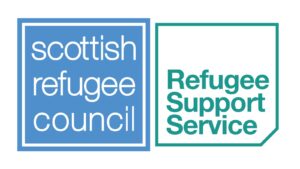Our national helpline offers a lifeline for people struggling to make sense of the complex refugee and asylum system. It is the first point of contact for our Refugee Support Service, providing free, confidential information and advice to those who need it, wherever in Scotland they are based.
At 9am on Friday morning another busy day begins on the Refugee Support Service helpline. Calls start coming in straight away.
Niamh is one of seven expert helpline advisors. In the three months from September to November, this small team has responded to over 3,300 calls from people in 22 local council areas across Scotland.
Niamh explains: “There can be a real mixture of calls. When you pick up, you never know what you’re going to get. It’s a total unknown.
“We’ve had a few calls recently from people who came to the UK through Family Reunion Schemes and their relationships have broken down. It’s quite a complicated and scary situation for people to be in. We’re reassuring callers, making them aware of their rights, and advising them to get legal advice.
“As it’s starting to get colder, we’re also getting calls from people wanting to know where they can find winter clothes. We’ll link them with organisations in their area that can help.”
Supporting people in crisis
Scotland is in the grip of a housing crisis. As the day goes on, the impact this is having on people seeking safety becomes increasingly clear. Many callers are homeless. Some are sofa surfing with friends, others have been sleeping rough on the cold, wet streets.
Niamh and her colleagues do what they can to ensure people have somewhere safe and dry to stay over the weekend.
She explains: “People calling because they’re homeless is always hard, especially when it’s the start of the weekend. It can be tricky when they’ve been staying with a friend. If they fall out and are asked to leave, they have nowhere else to go. If you’ve been staying in asylum accommodation, you have a better chance of getting emergency accommodation because you’re already in the system.
“It can be quite emotionally heightened. When people are granted refugee status, they think everything is going to get better, but in reality, we know they might end up rough sleeping for a few days before they get accommodation because there aren’t enough spaces in homeless hostels.
“Even after people are off the streets, they often end up in unsuitable accommodation for long periods of time. We’re hearing from a lot of families that have been in hotels for months. It’s challenging when someone calls in a difficult situation and there isn’t much you can do to help them with an immediate solution.”
Helpling with a wide range of issues
Callers contact our Refugee Support Service helpline about a broad range of issues from problems with housing and questions about where to get a new SIM card, to survivors of human trafficking in need of help and support. Some calls only take a few minutes. Others last much longer.
Niamh says: “When you get a more complicated case, you can be on the call for over an hour. You might book appointments for someone with local authorities and with other charities that provide specialist support.
“Then you might need to go back and forth contacting social work or lawyers to advocate for the person, get more information, or confirm certain details before calling them back. You could be keeping an eye on that case over the course of the day, or maybe several days.”
Providing confidential multilingual advice
Our multilingual helpline advisors speak nine languages between them, including Dari, Farsi, French, Pashto, Swahilli, Ukrainian, Urdu and Yoruba. Interpreters are also available for callers who need them.
On average, each helpline advisor will respond to between 8 and 12 calls a day. In the last quarter, around 89% of queries were from people seeking asylum and people recognised as refugees.
The other 11% came from charities, local authorities and members of the public looking for information to support people seeking safety.
More than 2,000 callers were contacting our service for the first time.
Today, Niamh and her colleagues have referred multiple callers on to foodbanks, pantries and charities that provide hot meals and a bed for the night. They have applied for crisis grants for people who have no money for food and contacted emergency housing teams at local councils on behalf of scores of clients facing homelessness and destitution.
Niamh says: “We’re providing compassion to people who are in a very non-compassionate system. The helpline is somewhere they can come for advice and support in what can otherwise be a very isolating and confusing experience. We try to reassure and empower people by explaining their next steps and giving them information to help simplify and make sense of a really complicated system.”
Our helpline is open Monday to Friday from 9am until 5pm.
If you need urgent information and advice on refugee and asylum issues, call our free helpline on 0808 1967 274.
We receive a high volume of calls and you may be placed in a queue before you speak to an advisor.
Alternatively, if you work for an organisation that supports people seeking refugee protection, you can contact us by email at refugeesupport@scottishrefugeecouncil.org.uk.

